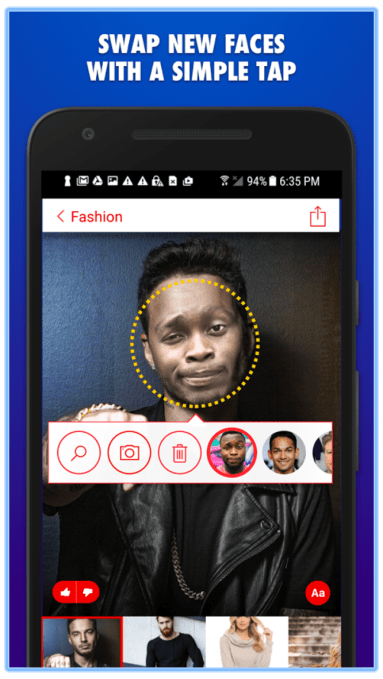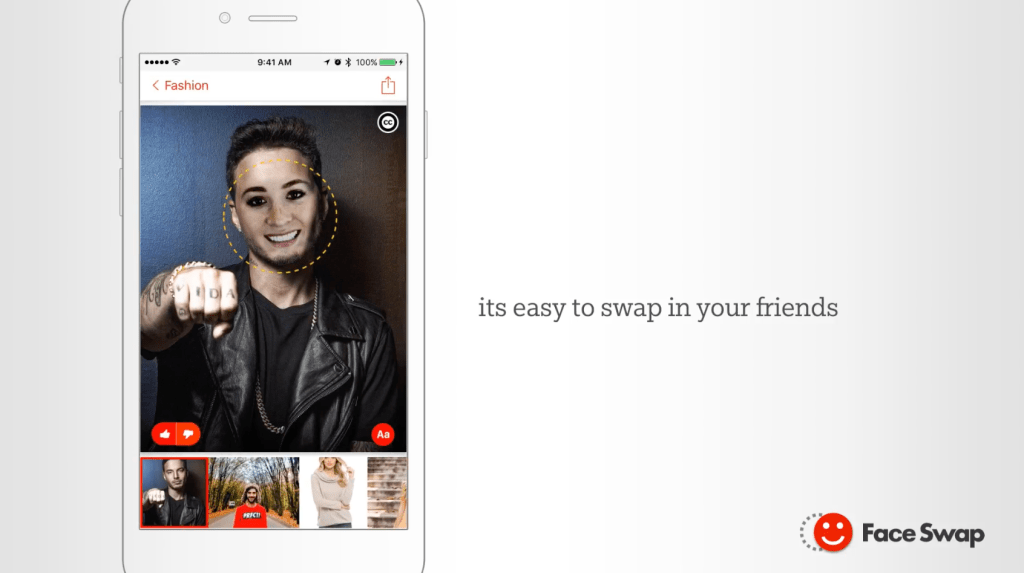Face-swapping — taking your image and adjusting it to fit on to a different body, creature or object — has taken the photo app world by storm, as millions of people look for new and novel things to do with their selfies. Microsoft is the latest company to enter the fray. The company’s in-house app studio Microsoft Garage has quietly launched a new app — the aptly called Face Swap.
The Android app is now live in the U.S., Australia and Canada, with plans to expand to India and iOS in the coming weeks, a spokesperson tells us.
Part image search engine, and part photo editing toolkit, you take a pic of yourself, adjust it a little, and then use keywords to find an image where you can replace the face with yours either from your camera roll, from the catalog in the app, from the wider world of images as indexed by Bing. Microsoft automatically adjusts your skin tone to the surroundings and textures, and you can make other edits with lighting and tilting and resizing your face, before sharing it on other social channels.
Microsoft notes some of the more practical applications: trying out a new hairstyle or seeing how an article of clothes looks with your face (although not your actual body, yet). You can swap out multiple pics in a group photo, too.
For those who may be keeping tabs on Microsoft, the name ‘Face Swap’ may sound a little familiar. That’s because Microsoft, by way of Microsoft Research, actually released another app back in 2011 that was also called Face Swap. That earlier Face Swap was just for Windows devices, and it never really caught on.
Or maybe it was just a little too ahead of its time.
Today, face-editing tools are everywhere. Apps like Snapchat let you morph into different creatures.
And FaceApp had its 15 minutes of fame for letting you take a pic of yourself or someone else and view that same picture in a foursquare as a younger person, an older person, and with changed gender (yes, sometimes controversially).
Facebook has snapped up Msqrd, Apple acquired Faceshift, and we’ve heard others are also on the hunt for their own tech and talent in computer vision and neural network processing (two cornerstones behind how a lot of these apps work), to built out virtual reality and augmented reality applications, expand their video services, and keep consumers entertained.
 Microsoft also wants to be in on the action, and it’s actually starting with a very substantial trove of its own assets. A spokesperson confirmed to us that the new Face Swap app was built using 3D face modelling from the computer vision team at Microsoft Research (that is, the tech that went into the old Face Swap app). The team also “we made several algorithmic improvements to build a highly scalable face-swap service on Azure.”
Microsoft also wants to be in on the action, and it’s actually starting with a very substantial trove of its own assets. A spokesperson confirmed to us that the new Face Swap app was built using 3D face modelling from the computer vision team at Microsoft Research (that is, the tech that went into the old Face Swap app). The team also “we made several algorithmic improvements to build a highly scalable face-swap service on Azure.”
While the Garage develops a number of different services (like this app to enhance colors for color-blind people) Face Swap was created by a team of people in the Garage called the “Bingcubator” — which, as its name implies, is focused on figuring out innovative ways to use the Bing search algorithms to create funky new services. “The power of Bing search and our intelligent face swapping tech makes every swipe a delight,” engineer Phil Rogan notes.
But while Bing — like all search engines — is predicated on audiences, advertising, and people clicking on lines for its business model, the same does not go for the Bing-powered Face Swap.
“Search & transport yourself into fun & inspirational scenes,” Microsoft notes on its YouTube video (embedded below) showing off the wonders of Face Swap. “No Ads, just swaps.”
Time will tell if the no-ad rule remains, and indeed if the app takes off at all. There is a lot of heated competition. Maybe the little twist here, of being able to search across a huge range of images to swap your face, will give this the unique selling point it needs to get some buzz.
And I’m guessing Microsoft hopes that buzz is positive rather than iffy. As we’ve seen before, image swapping apps can sometimes backfire in awful ways.































Comment